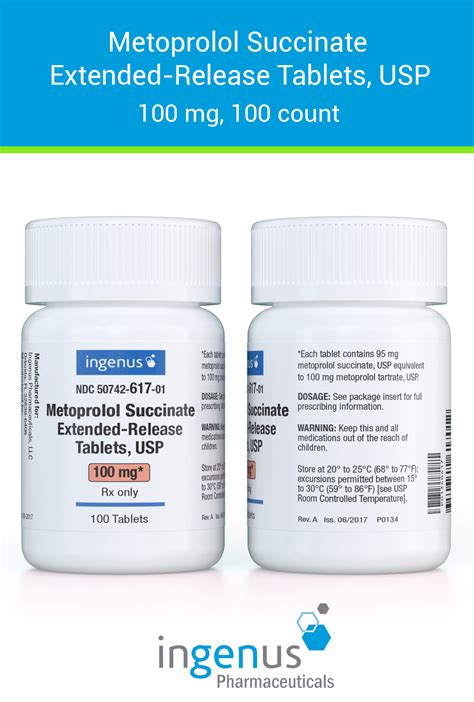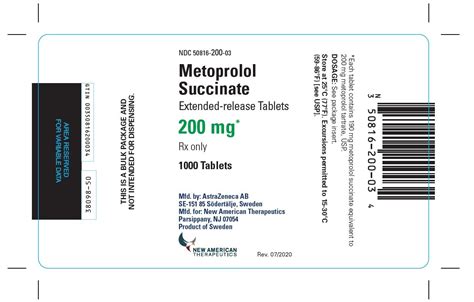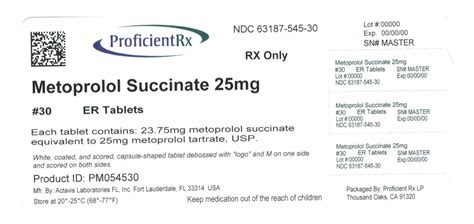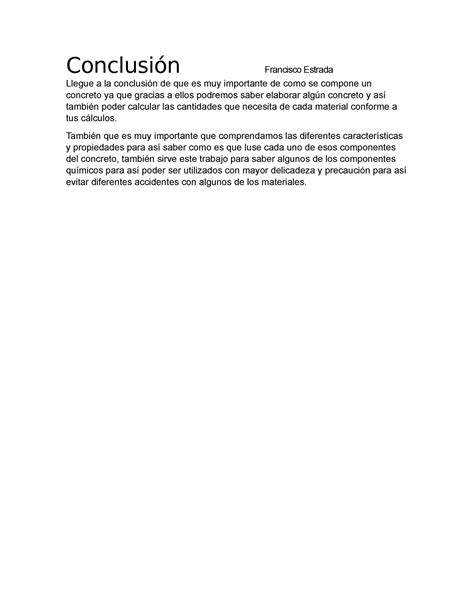Intro
Discover Metoprolol Succinate, a type of beta blocker, used to treat hypertension, angina, and heart failure, by slowing heart rate and reducing blood pressure, with benefits including improved cardiovascular health and reduced risk of heart attacks and strokes.
The use of beta blockers, particularly metoprolol succinate, has been a cornerstone in the management of various cardiovascular conditions for decades. These medications have been extensively studied and proven to be effective in reducing morbidity and mortality in patients with heart failure, hypertension, and coronary artery disease. The importance of understanding how metoprolol succinate works, its benefits, and its potential side effects cannot be overstated, as it is a widely prescribed medication that affects the lives of millions of people worldwide.
Beta blockers, including metoprolol succinate, function by blocking the effects of the hormone epinephrine, also known as adrenaline, and by slowing the heart rate and reducing its workload. This mechanism of action is crucial in managing conditions where the heart is under excessive stress, such as in heart failure or during a heart attack. By reducing the heart's demand for oxygen, beta blockers can help prevent further damage to the heart muscle and improve survival rates.
The significance of metoprolol succinate lies in its extended-release formulation, which allows for once-daily dosing and improved patient compliance. This is particularly important for chronic conditions that require long-term management, as adherence to medication regimens is a significant factor in achieving desired outcomes. Furthermore, metoprolol succinate has been shown to be effective in reducing the risk of death and hospitalization in patients with heart failure, making it a vital component of treatment guidelines for this condition.
Introduction to Metoprolol Succinate

Metoprolol succinate is a beta-1 selective adrenergic receptor blocker, which means it primarily affects the heart and has less of an impact on airway resistance and peripheral blood vessels compared to non-selective beta blockers. This selectivity reduces the risk of certain side effects, such as bronchospasm in patients with asthma, making metoprolol succinate a safer option for a broader range of patients.
Pharmacokinetics and Pharmacodynamics
The pharmacokinetics of metoprolol succinate involve its absorption, distribution, metabolism, and excretion. After oral administration, metoprolol succinate is absorbed and then undergoes extensive first-pass metabolism, resulting in a bioavailability of approximately 50%. The drug is widely distributed throughout the body and is metabolized primarily by the liver. Its pharmacodynamics are characterized by a reduction in heart rate, contractility, and cardiac output, leading to decreased blood pressure and reduced oxygen demand.Benefits of Metoprolol Succinate

The benefits of metoprolol succinate are multifaceted and well-documented. For patients with heart failure, it has been shown to reduce the risk of hospitalization and death. In patients with hypertension, metoprolol succinate helps to lower blood pressure, reducing the risk of cardiovascular events such as stroke and heart attack. Additionally, its use in patients with coronary artery disease can decrease the frequency of angina attacks and reduce the risk of recurrent myocardial infarction.
Indications and Dosage
Metoprolol succinate is indicated for the treatment of hypertension, angina pectoris, heart failure, and to improve survival after a heart attack. The dosage of metoprolol succinate varies depending on the condition being treated and the patient's response. For hypertension, the typical starting dose is 25-100 mg once daily, which can be increased as needed. In heart failure, the dose is usually initiated at 25 mg once daily and may be increased to achieve optimal clinical response.Side Effects and Precautions

While metoprolol succinate is generally well-tolerated, it can cause side effects, including dizziness, fatigue, and shortness of breath. These effects are usually mild and transient but can be more severe in some cases. Precautions should be taken in patients with certain conditions, such as asthma, diabetes, or peripheral arterial disease, as beta blockers can exacerbate these conditions. Additionally, metoprolol succinate should be used with caution in patients with liver or kidney disease, as it may affect the metabolism and excretion of the drug.
Interactions with Other Medications
Metoprolol succinate can interact with other medications, altering its efficacy or increasing the risk of side effects. For example, concurrent use with other beta blockers, certain anti-arrhythmics, or calcium channel blockers can lead to additive effects, potentially resulting in excessive bradycardia or hypotension. Furthermore, metoprolol succinate can interact with non-steroidal anti-inflammatory drugs (NSAIDs), reducing its antihypertensive effect.Practical Considerations for Patients

For patients taking metoprolol succinate, it is essential to follow the prescribed dosage regimen and attend scheduled follow-up appointments with their healthcare provider. Monitoring of blood pressure, heart rate, and kidney function may be necessary, especially during the initial stages of treatment or when adjusting the dose. Patients should also be aware of the potential for side effects and interact with their healthcare provider if they experience any unusual symptoms.
Tips for Adherence
Adherence to metoprolol succinate therapy is crucial for achieving optimal outcomes. Patients can improve adherence by: - Taking the medication at the same time every day - Using a pill box or reminder to help remember doses - Informing their healthcare provider about any side effects or concerns - Regularly attending follow-up appointments - Understanding the importance of their medication in managing their conditionFuture Directions and Research

Research into beta blockers like metoprolol succinate continues, with ongoing studies exploring new indications, optimal dosing strategies, and potential interactions with emerging therapies. The development of novel beta blockers with improved selectivity and reduced side effect profiles is also an area of active investigation. Furthermore, the role of metoprolol succinate in managing cardiovascular disease in specific populations, such as the elderly or those with comorbid conditions, requires further elucidation.
Implications for Clinical Practice
The findings from ongoing research will have significant implications for clinical practice, potentially leading to updated treatment guidelines and improved patient outcomes. Healthcare providers should stay informed about the latest evidence and recommendations, integrating this knowledge into their practice to provide the best possible care for their patients.Conclusion and Final Thoughts

In conclusion, metoprolol succinate is a valuable medication in the management of cardiovascular diseases, offering numerous benefits and a favorable safety profile when used appropriately. Its role in reducing morbidity and mortality makes it a cornerstone in the treatment of heart failure, hypertension, and coronary artery disease. As research continues to uncover new aspects of beta blocker therapy, healthcare providers and patients alike must remain informed and engaged to optimize the use of metoprolol succinate and improve cardiovascular health.
A Call to Action
We invite readers to share their experiences or ask questions about metoprolol succinate in the comments below. By engaging in this discussion, we can foster a community that promotes education, awareness, and optimal management of cardiovascular health. Share this article with someone who might benefit from this information, and let's work together towards a healthier future.What is metoprolol succinate used for?
+Metoprolol succinate is used for the treatment of hypertension, angina pectoris, heart failure, and to improve survival after a heart attack.
How does metoprolol succinate work?
+Metoprolol succinate works by blocking the effects of the hormone epinephrine, slowing the heart rate, and reducing the heart's workload.
What are the common side effects of metoprolol succinate?
+Common side effects include dizziness, fatigue, and shortness of breath. These effects are usually mild and transient but can be more severe in some cases.
